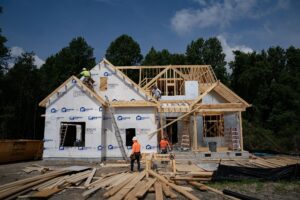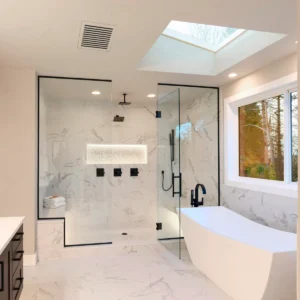Older Homes, Flips, and New Construction
When purchasing a home, understanding the unique challenges and benefits of each option is crucial. Whether you’re considering an older home, a flipped property, or a new construction, taking the time to evaluate your choices thoroughly can save you money and stress. Below, we break down what to look for in each type of home to help guide your decision.
Older Homes
Preserving Character and Addressing Maintenance Needs
Older homes often captivate buyers with their charm and character. Features like intricate woodwork, original flooring, and unique architectural designs add significant appeal. However, these homes usually require more maintenance and care to preserve their historical value.
Start by inspecting the foundation, plumbing, and electrical systems. These are critical components that may need updates to meet modern standards. Roofs and windows in older homes also tend to show wear and may require immediate attention.
Pay attention to lead paint or asbestos in homes built before the 1970s. These materials are hazardous and can be costly to remove. It’s wise to budget for unexpected repairs or renovations. Older homes often come with surprises, so prepare for potential hidden issues.
To avoid costly mistakes, hire a home inspector who specializes in older properties. Their expertise can uncover problems that are not obvious during a casual walkthrough.
Flipped Properties
Examining Materials and Workmanship
Flipped homes appeal to buyers because they often look move-in ready. However, not all renovations prioritize quality over cost. Some contractors cut corners to save money, leaving buyers with subpar materials and workmanship.
Inspect the finishes carefully. Cabinet doors, flooring, and countertops should feel solid and well-installed. Look for gaps in trim or uneven paint, as these may signal rushed or incomplete work.
Ask for a detailed list of renovations completed on the property. This helps you understand what was updated and what remains untouched. Focus on structural changes, as improperly executed work can lead to expensive repairs down the line.
Be cautious of homes flipped in less than a few months. Fast turnarounds can indicate that contractors prioritized speed over quality. A home inspector or general contractor can assess whether the renovations meet industry standards and identify any red flags.
New Construction
Spotting Imperfections in Modern Builds
New construction homes often attract buyers with modern layouts, energy-efficient features, and customizable options. However, the fast-paced nature of construction projects can lead to oversights and imperfections.
Start by reviewing the builder’s reputation. Research online reviews and speak with homeowners who purchased from the same developer. A strong reputation usually signals higher quality and better customer service.
Inspect the home thoroughly, even if it’s brand new. Look for cosmetic flaws, such as uneven drywall or misaligned fixtures. Pay attention to the fit and finish of doors, windows, and cabinetry. These small details often reflect the builder’s overall standards.
Ensure the home comes with a warranty covering structural and cosmetic issues. A reputable builder stands behind their work and provides coverage for any necessary repairs.
Hiring a home inspector before closing is a smart move. They can catch problems that might not be obvious during your walkthrough. Even new homes can have defects, so never skip this crucial step.
Enlisting Professional Help
Regardless of the type of home, consulting a professional is essential. A qualified home inspector or experienced general contractor can provide an unbiased opinion on the property’s condition. Their expertise helps you make informed decisions and avoid costly surprises.
Budget for the cost of inspections, as they are an invaluable part of the buying process. Professionals can identify potential deal-breakers and help you negotiate repairs or price reductions with the seller.
When viewing homes, bring a checklist of important features and questions. Staying organized ensures you’re evaluating each property thoroughly. From the roof to the foundation, no detail should be overlooked.
In conclusion, buying a home requires careful consideration of your options and thorough inspections. Whether you choose an older home, a flipped property, or a new construction, understanding the potential risks and rewards helps you make a confident decision. Always rely on professionals to guide you, ensuring that your investment is sound and your new home brings years of happiness.
Contact Aureli Construction
Phone: 617.480.6836
Email: [email protected]
Website: https://homeadditionma.com







